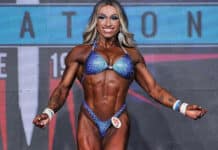Bodybuilding Coach Guru George Farah says that statistically most bodybuilding comebacks fail… could Big Ramy buck the trend?
The third episode of the digital series, A Conversation With George Farah, continues to offer deep dives into the bodybuilding world. In this installment, George Farah known as the guru in bodybuilding shares his perspectives on the dynamics of recent competitions, the future of top athletes, and the intersection of health and bodybuilding. In a highlight, George Farah shares his expert opinion as to whether or not Big Ramy can succeed in a comeback when so many other comebacks fail.
Our conversation with George Farah continues this week and we cover a wide variety of in-depth topics including:
- Is the recent lack of repeat champions better for the sport compared to a long-term reigning champion?
- How many bodybuilding comebacks actually succeed? Can Big Ramy pull one off?
- Can bodybuilding on a pro level be healthy when pushing to such extremes?
George Farah provides enlightening insight into these topics and more in our latest episode. Let’s dive in below!
The Impact of Non-Repeat Champions in Bodybuilding
Reflections on Phil Heath’s Winning Streak
The episode begins with a discussion about the implications of having fewer repeat champions in recent years compared to Phil Heath’s seven-time victory streak. George Farah starts by reflecting on Heath’s dominance and expresses his belief that Kai Greene should have won the 2014 Olympia. Greene lost by a single point that year, a result that Farah found deeply disappointing.
The Benefits of Diverse Champions
Farah believes that the current lack of repeat champions is beneficial for the sport. It makes the Olympia more exciting and unpredictable. He praises the recent judging, considering it fantastic, and credits Jim Manion’s takeover of the IFBB Pro from Wayne DeMilia as a positive change. Farah recounts his own experience competing in New York, where inconsistent judging left him baffled and frustrated, further solidifying his approval of the new leadership and judging standards.
Big Ramy: Compete or Retire?
Big Ramy’s Recent Performances
Vlad Yudin then asks Farah whether Big Ramy should continue competing or consider retirement based on his recent performances. Farah candidly states that Big Ramy was not at his best during the last Olympia. He predicted Ramy would place fifth after the prejudging, a prediction that did not sit well with Ramy’s sponsors and even upset Ramy himself. However, they eventually resolved their differences.
Future Prospects for Big Ramy
Despite the recent dip in performance, Farah believes that Big Ramy still has the potential to win again. He emphasizes that Ramy possesses the necessary physical attributes—size, muscle mass, and an impressive physique. The real challenge lies in Ramy’s mental readiness and determination. Farah personally feels that Ramy has nothing left to prove, having already secured two Olympia titles, which is a remarkable achievement in itself.
Transition in Coaching: Andrew Jacked and Beyond
Current Status with Andrew Jacked
When asked if he is still Andrew Jacked’s trainer, Farah clarifies that Chris Aceto is now working with Jacked. Farah explains that he has reduced his client volume to focus on starting his preventative medicine practice. Lately, his efforts have been more directed towards working with amateur athletes and competitors in Men’s Physique categories.
Health and Bodybuilding: Can They Coexist?
Balancing Health and Competitive Success
The conversation then shifts to the feasibility of promoting health at the highest levels of bodybuilding. Farah highlights Dexter Jackson as a prime example of achieving longevity and health in the sport. Jackson, who has won the most bodybuilding shows in history and is now 54 years old with grandchildren, embodies the possibility of balancing health and success.
The Role of Steroids and Lifestyle Choices
Farah acknowledges the prevalent use of steroids among professional bodybuilders, but he emphasizes the importance of responsible usage. He points out that the dosage, administration, and accompanying lifestyle and diet significantly impact an athlete’s health. Farah is critical of bodybuilders who neglect their overall health in favor of muscle growth, stressing the need to focus on gut health and immune system strength. He believes that without a healthy foundation, bodybuilders risk serious health issues or an early death.
Food as Medicine
In a poignant conclusion, Farah underscores the idea that food can either be medicine or a destructive force. He urges bodybuilders to prioritize a diet that supports overall health and longevity, rather than solely focusing on muscle and strength. Farah’s holistic approach to health and bodybuilding serves as a powerful reminder of the importance of maintaining balance in the pursuit of excellence.
Wrap Up
Episode three of A Conversation With George Farah continues to deliver insightful and thought-provoking content. George Farah’s reflections on recent competitions, the future of top athletes like Big Ramy, and the critical balance between health and bodybuilding success offer valuable lessons for the bodybuilding community. His emphasis on responsible coaching, athlete health, and the evolving standards in bodybuilding judging add depth to the conversation.
As the series progresses, viewers can anticipate more enlightening discussions and expert perspectives from George Farah. This episode is a must-watch for anyone interested in the intricacies of bodybuilding and the vital interplay between health and competitive success.
Check out the full episode above. And don’t forget to check back next week for a new episode only on the Generation Iron Fitness Network!
*Header image via Instagram @big_ramy















